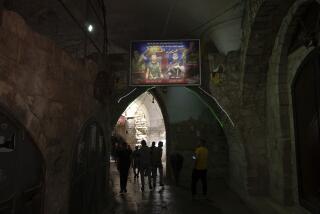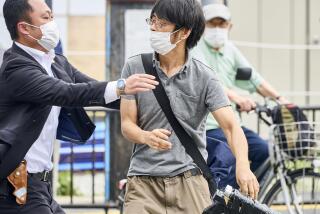Government in Somalia to seize weapons
As Somalia’s parliament prepared to convene for the first time since the transitional government took control of this capital last week, the prime minister vowed Thursday to begin seizing heavy weapons in Mogadishu, by force if necessary.
Prime Minister Ali Mohammed Gedi predicted that the gun collection would go peacefully, however, saying the government had reached deals with major businesspeople and warlords holding about 60% of the city’s weapons.
During a three-day grace period that ended Thursday, fewer than 50 Mogadishu residents turned in their guns, in a city of 2.5 million.
Gedi said the government would first focus on collecting heavy weapons, such as trucks mounted with antiaircraft guns, known here as technicals, and armored vehicles. The effort will then be expanded to include assault rifles and handguns owned by individuals. An aide said the government had identified about 400 technicals in the city that authorities planned to seize today.
“We are targeting those sites,” Gedi said, after presiding over the swearing-in of newly appointed judges at a Mogadishu courthouse. “We will not start with house-to-house [searches].... The stakeholders are ready to cooperate and hand over” weapons.
The government is scrambling to complete disarmament as quickly as possible, while it still has the support of more than 4,000 Ethiopian troops in Somalia.
Since Somalian and Ethiopian troops seized the capital from Islamist fighters, the government has moved slowly to fill the security vacuum. About 2,000 government soldiers are based around Mogadishu, only half the number needed to secure the city, Gedi said. About 500 newly trained police officers are en route from Baidoa, which has served as the government’s interim capital. Somalia is negotiating to bring in African Union peacekeepers from Uganda, Nigeria and South Africa.
Residents and major clans have voiced reluctance to give up their guns until they are assured that the government can keep the peace. Over the last week, militias loyal to warlords have reasserted control in some neighborhoods. For the first time since the Islamic Courts Union, a coalition of Muslim leaders, took power in June, gunfire now echoes through the streets again several times a day.
Hussein Aidid, the interior minister, said Thursday that more than 3,000 former Islamist fighters were hiding in Mogadishu, including the leader of one of the Islamic courts’ most extreme factions, known as Shabab. He said Islamist fighters were planning guerrilla attacks in the city, including the assassination of top officials. The disarmament campaign will focus first on collecting weapons left behind or hidden by fleeing Islamists, he said.
“We have to go after those before they sell these very dangerous weapons in the market,” Aidid said.
Prices for AK-47s and machine guns, after falling early this week at the start of the voluntary hand-over period, are now on the rise. With daily radio reports about the latest prices and sales, residents are tracking gun market activity the way Western investors monitor Wall Street, using the ups and downs to measure consumer optimism.
Gedi said Thursday that the gun market eventually would be shut down, though the government was moving cautiously. Even the tightfisted Islamic Courts Union, which last year largely succeeded in disarming Mogadishu for the first time in 15 years, was never able to shutter the gun market, one of the most dangerous parts of the city.
Both Gedi and Aidid plan to travel to Baidoa today to participate in the parliament session and request approval to impose martial law.
It is the first session since the transitional government seized control of most of southern Somalia, and citizens are watching to see whether lawmakers will be able to set aside differences that have paralyzed them in the past.
One faction unsuccessfully tried to remove Gedi through a vote of no-confidence. Before that, some lawmakers based themselves in Mogadishu, while others insisted that Baidoa should be the provisional capital because of security concerns. During meetings last year in Nairobi, Kenya, infighting among Somalian legislators was so bad that a parliament session turned into a chair-throwing brawl that was broken up by Kenyan police.
Gedi said that government and Ethiopian troops continued to search deserted bush areas near the Kenyan border for fleeing leaders of the Islamic courts. Among those on the run are believed to be three suspects in the 1998 bombings of U.S. embassies in Kenya and Tanzania. The United States is assisting in the search, he said, providing surveillance from the air and sea.
“The U.S. is leading the war against terror,” he said. “So it’s the major stakeholder in this matter.”
More to Read
Start your day right
Sign up for Essential California for news, features and recommendations from the L.A. Times and beyond in your inbox six days a week.
You may occasionally receive promotional content from the Los Angeles Times.






